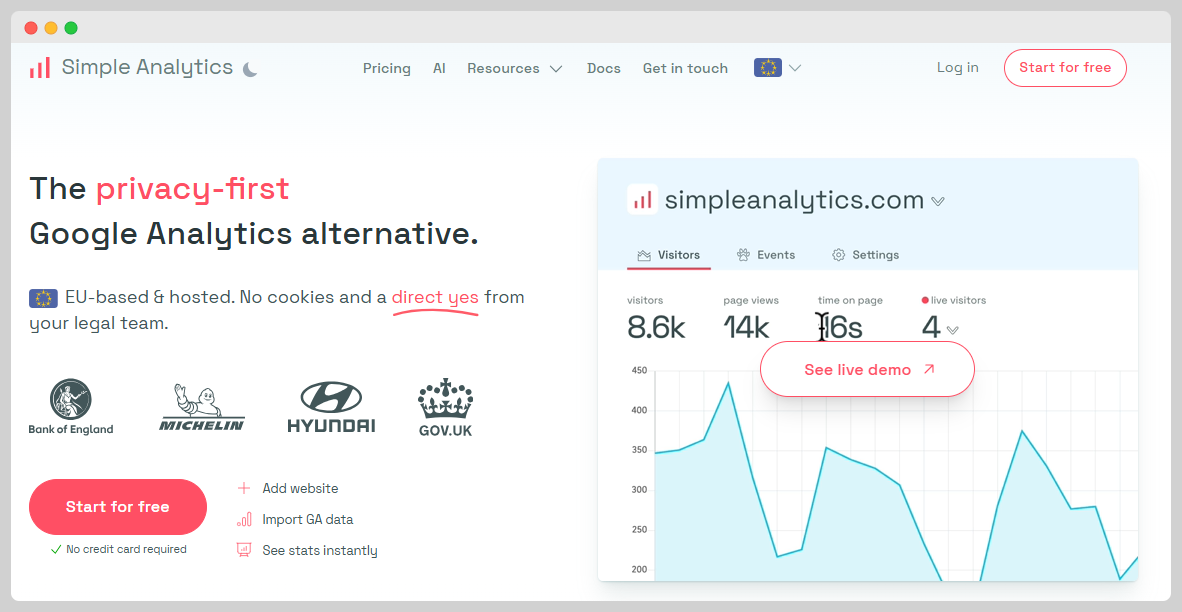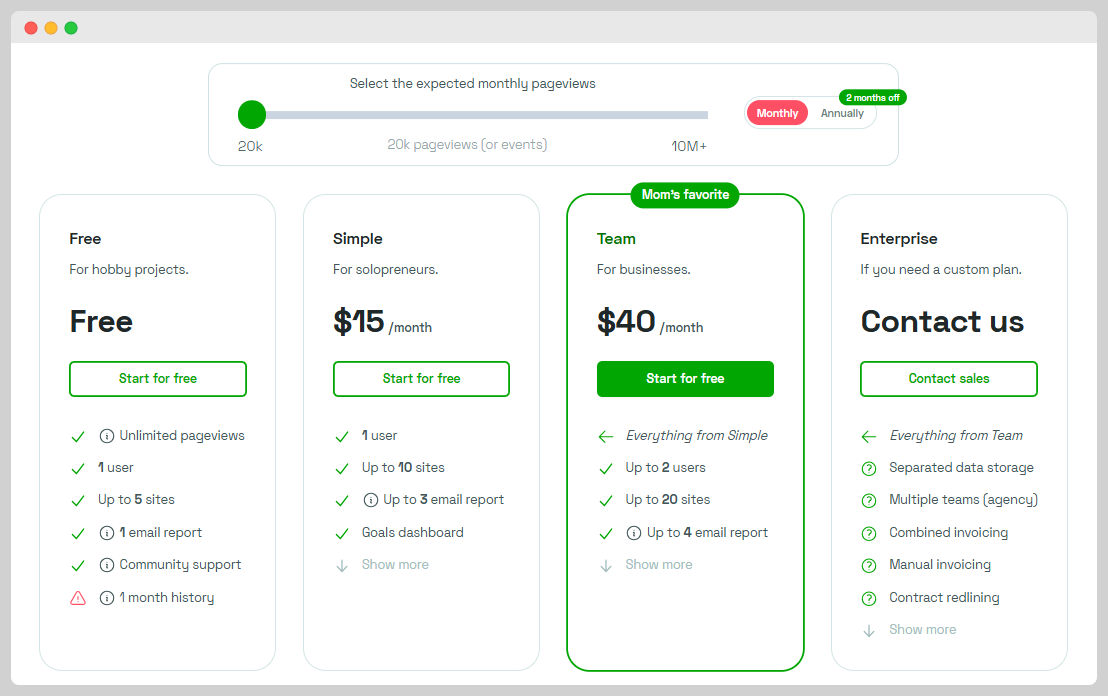How Adriaan Bootstrapped Analytics Tool to $35K MRR
Who is Adriaan?
Adriaan, the founder of Simple Analytics, hails from a small village in the south of the Netherlands and now resides in Amsterdam. He started programming as a teenager learned from his older brothers and previously worked as a freelance developer, which equipped him with the skills to create Simple Analytics as a privacy-focused alternative to Google Analytics.
What problem does Simple Analytics solve?
Simple Analytics addresses the frustration of users drowning in the complexity and data harvesting practices of Google Analytics by offering a straightforward, privacy-friendly alternative.

How did Adriaan come up with the idea for Simple Analytics?
Adriaan was driven to create Simple Analytics out of frustration with existing analytics tools like Google Analytics. While working as a freelance programmer, he noticed that implementing Google's tool meant giving user data to a large corporation, which felt invasive and profit-driven. This concern for privacy led him to the idea of building a simple alternative that respects user data.
He shared this insight with his girlfriend during a trip, and that conversation sparked the concept of an analytics platform that prioritizes data ownership. Adriaan developed a basic prototype over a few months, focusing on core functionality and privacy features, and tested it with a small group of users who gave positive feedback. This validation was crucial and motivated him to refine the product further, with an emphasis on user-friendly simplicity.
As Adriaan advanced his idea, he faced the challenge of ensuring the product resonated with a community wary of privacy breaches, and he used platforms like Hacker News to gauge interest and gain initial traction. This experience taught him the value of transparency and simplicity, both in product design and in building trust with customers.
How did Adriaan build the initial version of Simple Analytics?
Adriaan built Simple Analytics by leveraging his programming skills acquired since his teenage years to create a privacy-focused alternative to Google Analytics. He developed the first prototype, which was a simple graph and snippet, over two months while doing freelance work to support himself financially. The initial development phase included basic functionalities to collect website analytics without compromising user privacy, omitting features like IP address collection to avoid violating data privacy. Adriaan collaborated with a designer later to enhance the visual interface, while he personally managed the coding and product marketing, including preparing for launches on platforms like Hacker News. The challenging aspect of the build was balancing development with freelance work, requiring efficient time management and a focus on building a sustainable, minimally viable product suitable for charging customers.
What were the initial startup costs for Simple Analytics?
""" - Bootstrapping: Simple Analytics was bootstrapped with no VC funding, relying on the founders' own efforts and resources. """
How did Adriaan launch Simple Analytics and get initial traction?
Reddit Engagement
Simple Analytics turned to Reddit for early traction. They participated in conversations on subreddits relevant to their niche, such as ones focused on privacy and analytics. Instead of overtly advertising the product, they engaged in discussions, helped users with their problems, and subtly introduced their tool as a possible solution.
Why it worked: Engaging authentically built trust and credibility. By becoming a valuable member of niche communities, the founder was able to establish Simple Analytics as a trusted alternative to mainstream options like Google Analytics.
Hacker News Feature
The founder launched Simple Analytics on the “Show HN” section of Hacker News. This platform, like Reddit, has strict regulations about self-promotion, so participation had to be genuine. The launch post was crafted to capture attention with a compelling title and clear value proposition.
Why it worked: HN's user base includes tech-savvy individuals and potential early adopters. Being featured on the HN homepage for several hours led to significant visibility and a direct influx of early users.
Quora Answers
To tap into another audience, the Simple Analytics team answered questions on Quora related to website analytics, privacy concerns, and Google Analytics alternatives. They focused on questions with high views but few answers to maximize visibility.
Why it worked: Quora questions often appear in Google search results. Providing high-value responses not only positioned Simple Analytics as an expert but also drove traffic from search engines to their website.
Communities & Directories Listing
Simple Analytics submitted their business to online communities and directories like Indie Hackers and Betalist. These platforms cater to startups and early adopters who are always on the lookout for new tools.
Why it worked: This strategy provided exposure with minimal effort. Such directories usually offer backlinks to the business website, which also helped in improving search engine rankings.
Metrics:
- Within a few months of the launch, Simple Analytics had 1300+ users and achieved $32K monthly recurring revenue.
What was the growth strategy for Simple Analytics and how did they scale?
SEO
Simple Analytics invested heavily in SEO to grow their user base from 1,000 to 13,000 monthly visitors. This was their primary growth channel due to its cost-effectiveness and long-term benefits, particularly important for their bootstrapped nature. They focused on optimizing content for specific, high-intent keywords like "Google Analytics alternative," which directly aligned with their privacy-focused, simple product offering. By ensuring their content met the user's search intent—providing valuable, relevant answers to niche questions—they managed to build substantial organic traffic.
Why it worked: The targeted SEO approach captured a steady stream of interested visitors who were actively seeking alternatives to Google Analytics, aligning well with their product's unique value proposition and the increasing market demand for privacy-focused analytics tools. This method also built their authority in the niche, which improved trust and conversion rates.
Reddit and Hacker News
Simple Analytics used Reddit and Hacker News to effectively reach potential users in tech-savvy communities. Engaging authentically on subreddits and participating in discussions allowed them to subtly introduce their product. On Hacker News, they utilized the "Show HN" section to showcase Simple Analytics, gaining significant initial traction when they reached the front page. Additionally, they created a "newsbot" to surface their content when relevant topics concerning Google Analytics emerged, cleverly inserting their solution into timely discussions.
Why it worked: These platforms provided access to their core audience—privacy-conscious developers and tech users. By offering genuine help and joining relevant conversations, they built credibility and drew attention without overt self-promotion, leading to organic growth from communities receptive to their message.
Affiliate and Referral Programs
Simple Analytics implemented referral and affiliate programs that incentivized users to share their product by offering rewards. Users could create affiliate links, and if someone signed up using their link, both parties benefited with free usage periods.
Why it worked: This created a motivated customer base willing to advocate for Simple Analytics, leading to increased brand awareness and customer growth at a low cost. The direct benefit to both referrer and referee encouraged participation, while the public nature of the dashboards users could share further enhanced visibility and credibility. This strategy leverages satisfied customers as ambassadors, effectively expanding network reach through word-of-mouth.
Community Contributions and Transparency
They submitted their business to directories and forums related to startups and privacy tools, contributing to communities like Indie Hackers. Through writing blog posts about privacy and startup life, they not only engaged with their target audience but also improved their search rankings through backlinks.
Why it worked: This built a strong foundation of trust and transparency, crucial for a product heavily reliant on privacy promises. Engaging with niche communities expanded their reach and demonstrated authority by sharing valuable insights. By maintaining public financial transparency and open communications, they reinforced their brand as an honest and trustworthy alternative, further boosting customer loyalty and acquisition through community trust.
What's the pricing strategy for Simple Analytics?
Simple Analytics employs a straightforward pricing strategy with plans starting at $15/month, focusing on simplicity and privacy without invasive data tracking, offering free trials for new users.

What were the biggest lessons learned from building Simple Analytics?
- Embrace Constraints for Creativity: Simple Analytics chose to bootstrap instead of seeking VC funding, which limited their resources but pushed them to find creative ways to grow. Constraints often lead to innovative solutions.
- Build Trust Through Transparency: By being transparent with their financials and operations, Simple Analytics built trust with their users. Being open can differentiate you in a crowded market and earn customer loyalty.
- Understand Your Market Fit: Before scaling, they ensured their product met clear market needs. Aligning product features with customer pain points and market trends is crucial for sustainable growth.
- Focus on Long-Term Growth Channels: They invested in SEO as a cost-effective growth strategy suited for their business model. Choosing the right growth channel aligned with your resources and business model can lead to steady growth.
- Effective Use of Early Traction Channels: Utilizing platforms like Reddit and Hackernews strategically helped Simple Analytics gain early traction. Engaging authentically in niche communities can provide significant exposure without high costs.
Discover Similar Business Ideas Like Simple Analytics
Rezi, an AI-powered resume builder, skyrocketed from a simple $9.69 Microsoft Word template to serving over 2.6 million job seekers and achieving a monthly recurring revenue of $215K, showing how clever branding, strategic early decisions, and creative growth hacking can turn a side project into a profitable SaaS business.
A passionate computer-coder entrepreneur shares the story behind his successful PDFShift business which after a year and a half generates $3.2k of monthly revenues with the focus now on growth.
More about Simple Analytics:
Who is the owner of Simple Analytics?
Adriaan is the founder of Simple Analytics.
When did Adriaan start Simple Analytics?
2018
What is Adriaan's net worth?
Adriaan's business makes an average of $35K/month.
How much money has Adriaan made from Simple Analytics?
Adriaan started the business in 2018, and currently makes an average of $420K/year.

Download the report and join our email newsletter packed with business ideas and money-making opportunities, backed by real-life case studies.

Download the report and join our email newsletter packed with business ideas and money-making opportunities, backed by real-life case studies.

Download the report and join our email newsletter packed with business ideas and money-making opportunities, backed by real-life case studies.

Download the report and join our email newsletter packed with business ideas and money-making opportunities, backed by real-life case studies.

Download the report and join our email newsletter packed with business ideas and money-making opportunities, backed by real-life case studies.

Download the report and join our email newsletter packed with business ideas and money-making opportunities, backed by real-life case studies.

Download the report and join our email newsletter packed with business ideas and money-making opportunities, backed by real-life case studies.

Download the report and join our email newsletter packed with business ideas and money-making opportunities, backed by real-life case studies.

